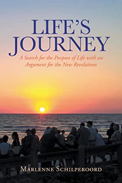
 |
Life's Journey: A Search for the Purpose of Life with an Argument for the New Revelations
by Marlenne Schilperoord
Westwood Books Publishing
Author Schilperoord has searched diligently for what are known as New Revelations to underscore her strong conviction that the tenets and philosophy of Christianity did not end with the Holy Bible. In a biographical segment, she describes her childhood in post-World War II Rotterdam, Netherlands, as she gradually came to understand the devastation that city and her nation suffered during the years of war and Nazi occupation. Working in a boring job and feeling little kinship with those of her general age and upbringing, she began to experience painful, persistent migraine headaches and other physical ailments. She suddenly resolved to take a trip around the world, with much emphasis placed on her visits to the Middle East, redolent of biblical lore. During that trek, she learned to control her diet, choose simple grains and other whole foods, and avoid animal products to improve her physical well-being.
She also initiated an inner journey, delving deeply into the possibilities for modern spiritual guidance suited to contemporary experiences and cultural ethics. This led to the study of the works of such luminaries as scientist and spiritual seeker Emanuel Swedenborg (1688-1772), then to Jakob Lorber, who created new biblical prophecy in the 1800s, and to the twentieth-century writings of Bertha Dudde, a composer of some 9,300 innovative scriptural texts. These writers envisioned God, Jesus, and other biblical figures in lively communication regarding every aspect of human experience. Dudde, for example, offered wisdom concerning lust, citing it as a deficit both to the physical body and to the soul. Swedenborg expressed that God's divinity is love in itself. The New Revelationists stressed the need for charitable acts, not merely faith alone.
Schilperoord writes with scholarly intellect, organizing and quoting from a small but potent aggregation of sources. She firmly establishes the weaknesses in some early influences on the formation of Christian churches as history knows them. For example, Martin Luther was curiously, virulently antisemitic. John Calvin, a leading light in the formation of Protestantism, "taught his congregants that they should not get involved with prophecies." Catholics similarly have accepted and continue to preach that the Bible is the last document necessary for people of faith. Such well-grounded assertions on the author's part demonstrate on almost every page her dedication to the ideal of approaching religion with an open mind and an astute eye to potential falsehoods that can easily be mistaken for holy writ, pointing out that Jesus never mentioned buildings or the need to belong to an organization to follow his teachings.
The author is a devoted Christian as evidenced by her recommended approach to divinity, prophecy, and leading a dedicated spiritual life. Her bold but well-substantiated statements stress the requirement to know and accept Jesus as one's personal savior while looking beyond the ancient biblical texts for a new, promising grasp of righteous living in the modern era. She presents her enlivening ideas in the sincere hope that they may offer fresh inspiration for a new generation, to ensure that God's words will still emerge in a novel and vibrant fashion now and in the future.
RECOMMENDED by the US Review